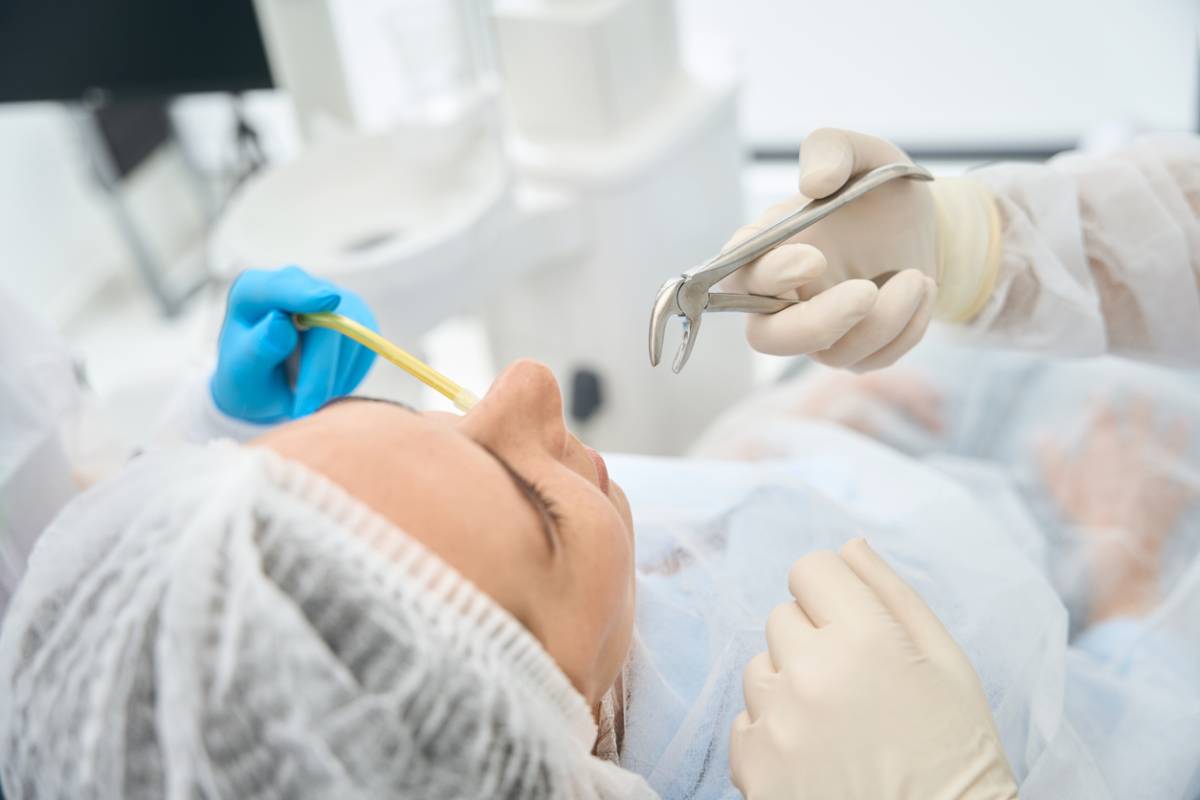A tooth extraction surgery is a very common procedure, successfully performed in almost every dental office every day. But what happens if a tooth breaks during extraction? In this article, we address this question and provide post-surgery care tips.
What Happens If a Tooth Breaks During Extraction?
Typically, to extract a tooth, your surgeon starts by loosening the surrounding tissue and separating the gum from the tooth. Then, dental forceps are used to pull the tooth out of its socket. In the majority of cases, when the tooth is visible and no additional steps are required, this procedure takes only a few minutes and does not cause significant discomfort to the patient due to the use of a local anesthetic.
Sometimes a tooth can break during extraction, especially if decay or previous treatments, such as root canals, have significantly weakened its structure. Additionally, your surgeon’s skill and technique can impact the process: a tooth can break if too much force is applied during extraction.
However, if your tooth breaks during extraction, it is usually not a cause for concern. If the remaining pieces of the tooth are visible above the gum line, your dentist can extract them with forceps. If the rest of the tooth is beneath the gum line, your doctor will employ some additional steps to extract the remaining pieces:
- The incision in the gum is made to access the remaining pieces of the tooth
- The pieces of the tooth are removed
- The sutures are used to close the gum
These steps are commonly used in tooth extraction procedures, especially when the tooth is initially hidden inside the gum (impacted wisdom teeth). An experienced dentist typically can perform such a procedure without complications.
Are There Risks of a Tooth Breaking During Extraction?
If a tooth breaks during extraction, potential complications include:
- Nerve damage if the fragments of the tooth are located close to a nerve
- Small bone fragments might be left behind after extraction. This condition typically resolves on its own, but in some cases, it may cause discomfort. Sometimes, your doctor may decide not to attempt removing tiny pieces due to their proximity to the nerve or sinus and the risk of damaging them.
- If not all the fragments are removed, infection might occur in some cases, especially if post-surgery care is inadequate.
Post-Tooth Extraction Care Tips
Regardless of whether your tooth is extracted without complications or some additional steps are used to extract a broken tooth, post-surgery care is crucial for proper and swift healing. We recommend that you closely follow your dentist’s instructions for your particular case. Typical post-tooth extraction care tips include:
- Maintain impeccable oral hygiene to prevent bacterial proliferation in the mouth and infection of the extraction site. Brush your teeth twice a day for at least two full minutes and floss thoroughly every evening. Remember to be very gentle when cleaning around the surgery site.
- Do not swish water in your mouth when rinsing to avoid disturbing the blood clot in the socket. Preserving the blood clot that forms in the socket immediately after surgery is a crucial step in achieving a successful recovery.
- Avoid any strenuous activities and keep your head elevated at all times to prevent excessive blood flow to the extraction site.
- Switch to liquid foods for the first 24 hours and then follow with a soft diet for the next few days, allowing the jawbone to rest and recover. Avoid crunchy foods that can get stuck in the extraction site.
- If your doctor prescribes antibiotics, take the entire course of medication as directed.
- Do not skip follow-up appointments, especially if the surgery was complicated and the sutures have to be removed.
Get a Safe Tooth Extraction at Baseline Dental
Choose an experienced dentist at Baseline Dental for a safe and stress-free tooth extraction procedure. We look forward to your visit to our dental office.


